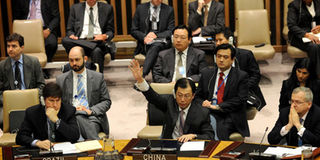Anxiety as Security Council meets over AU’s deferral request

The China delegation abstains during a past meeting of the United Nations Security Council. PHOTO | FILE
What you need to know:
Other than the United States, Britain and France are also opposed to the deferral of the cases
However, China and Russia support the resolution sponsored by Rwanda and two other African countries on the council
The United Nations Security Council will hold its plenary session Friday morning at the UN headquarters in New York to discuss what it describes in its order paper as ‘Peace and Security in Africa.’
It is largely expected that the Council will vote on the African Union and Kenya’s request for deferral of the cases at the International Criminal Court facing President Uhuru Kenyatta and his deputy, William Ruto
An official at the Security Council Chambers who did not wish to be identified told the Nation on Thursday evening that anxiety had gripped many permanent representatives who are stakeholders in the deliberations. She added that all members of the Council would attend Friday’s plenary meeting. “They are ready to make their respective governments’ positions known. This is a day dedicated for Kenya”, she said on phone.
This comes just a day after the ICC Chief prosecutor made a strong appeal to the Security Council members to fully support the international court.
In a speech in New York on Thursday, Fatou Bensouda told UNSC delegates that she was committed to end impunity in nations where atrocities against citizens have been committed. “I stress the critical importance for all States to respect and implement the decisions of the Court’s judges. The obligation to surrender to the Court persons against whom arrest warrants have been issued must be respected,” she stated.
The Nation has also established that the US ambassador to the United Nations, Samantha Power, was, by Thursday evening, not keen on supporting the deferral. A senior US official who sought anonymity because she is not authorised to speak to the media told the Nation that Ambassador Power was likely to reject the proposal. “The US position on this matter has not changed. There won’t be any surprises,” she said on Thursday.
Last week, soon after a consultative meeting convened to discuss the Kenyan situation, Ms Power suggested that since the ICC had postponed Mr Kenyatta’s trial to February next year, the matter should now be referred to the Assembly of State Parties on ICC. “Now that the ICC has postponed Kenyatta’s trial, Assembly of State Parties can weigh in on Botswana’s proposed revision to ICC rules of procedure,” said Power, who is a member of US President Barack Obama’s Cabinet. (READ: Uhuru trial pushed to February )
COUNCIL SPLIT
Other than the United States, Britain and France are also opposed to the deferral of the cases. Some developing countries on the council have also not been swayed by arguments in support of the resolution advanced by the African Union. (READ: Key US Senator opposes 'divisive' UN vote on ICC deferral)
However, China and Russia support the resolution sponsored by Rwanda and two other African countries on the council.
Last month, the African Union and Kenya formally wrote to the Security Council seeking the suspension of the cases on the grounds that they are undermining the Kenyan leaders’ efforts to fight terrorism.
But the move has been met by sharp criticism from human rights advocates and supporters of the court, who claimed that Kenya’s leaders are seeking to use their power to skirt justice for their alleged crimes. (READ: Rights group urges UN not to bow to 'political pressure' for deferral)
There are 15 members of the Security Council. This includes five veto-wielding permanent members: China, France, Russia, the United Kingdom, and the United States—based on the great powers that were the victors of World War II. There are also 10 non-permanent members, with five elected by the General Assembly each year to serve two-year terms. The current non-permanent members are Argentina, Australia, Azerbaijan, Guatemala, Luxembourg, Morocco, Pakistan, Rwanda, South Korea and Togo. (READ: 'No agreement' as showdown looms on UN deferral resolution)
Kenya’s ambassador to the UN, Macharia Kamau is expected to attend the session as an observer. The charter allows a State which is a Member of the United Nations but not of the Security Council to participate albeit without a vote. Both Members and non-members of the United Nations, if they are parties to a dispute being considered by the Council, may be invited to take part, without a vote, in the Council's discussions; the Council sets the conditions for participation by a non-member State.
Mr Kenyatta is charged, as an indirect co-perpetrator, with five counts of crimes against humanity consisting of murder, deportation or forcible transfer, rape, persecution and other inhumane acts allegedly committed during the post-election violence in Kenya in 2007-2008.
Mr Ruto is accused of being criminally responsible - as an indirect co-perpetrator - for the murder, deportation or forcible transfer of population in the same period.





